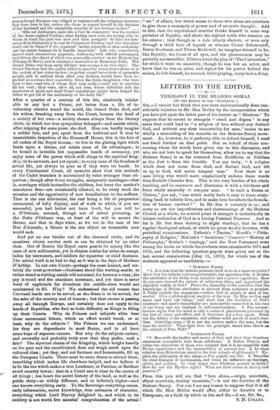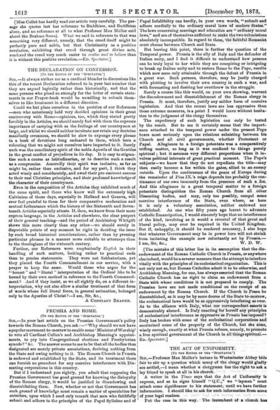LETTERS TO THE EDITOR.
THEOLOGY LX THE BRAHMO SOMAJ. MO THE EDITOR OF THE " SPROTATOI."1 cannot but think that you have unintentionally done con- siderable injustice to Mr. Max Muller by the interpretation which you have put upon the latter part of his lecture on "Missions." To suppose that he meant to abnegate "creed and dogma" in any sense that could lead to "a religion of love without any distinct God, and without any clear immortality for man," seems to me wholly a misreading of his remarks on the Brahmo-Somaj move- ment. As, however, he is perfectly able to defend himself, I need- not dwell further on that point. Bat on behalf of those con- cerning whom his words have given rise to this discussion, and who are not here to speak for themselves, allow me to say that the Brahmo Somaj is as far removed from Buddhism or Nihilism as the Jew is from the Gentile. You say truly, "A religion which does not come from God, and declare God, and lift us up to God, will never conquer man." Now there is no man living who would more emphatically endorse these words than Keshub Chunder Sen. This is the very burden of his whole teaching, and he enounces and illustrates it with a vividness and force which assuredly do conquer man. "Is such a Deism or Theism," you ask, "one which really finds it easy to trace every- thing back to infinite love, and to make love for others the founda- tion of human conduct ? " In Mr. Sen it certainly is so ; and many as are the imperfections and shortcomings of the Brahma Church as a whole, its central point of strength is Undoubtedly its intense realisation of God as a Living Personal Presence. And so far is Air. Sen from desiring to slight theology, that he has a. regular theological school, at which he gives weekly lectures, with periodical examinations. Tulloch's "Theism," Morell's "Philo- sophy of Religion," McCosh's "Intuitions," Cousin's "History of Philosophy," Butler's "Analogy," and the New Testament were among the books on which the students were examined in 1871 and 1872, and the following question-papers were given out at the last annual examination (May 11, 1873), for which ten of the students appeared as candidates :-
"MORNING PAPER.
"I. Is it true thatthe infinite presents itself tons as a mere negation ? Show that the infinite is incomprehensible, but apprehensible. 2. Evolve the attributes of the Deity from intuitive and a priori cognitions. Row do you pass beyond the sphere of subjective ideas, and apprehend the objective reality of God ? Prove the absurdity of the assertion that the knowledge of Divine attributes is derived from scripture or prophet 3. Fully explain the argnment,—either God in unjust or man is ihn- mortaL Give a philosophical analysis of the test 'In Him we BIT and move and have our being;' and show that the doctrines of God's existence and man's immortality are inseparably connected in the root of our being and are realised in self-consciousness. 4. The necessi- tarians argue that the mind is only a series of phenomena governed by the law of cause and effect, and is therefore not a free agent. Point out the fallacy of the argument, and adduce valid proofs of man's free- dom. Coleridge says,—' It is not the motive makes the man, bat the man the motive.' What light does the principle stated here throw AU the subject of Free Will?"
"AFTERNOON PAPER.
"1. Reconcile the justice and mercy of God, and show that vicarious atonement contradicts both these attributes. 2. Define Prayer, and refute the objections of those who contend that it is *compatible with Divine omniscience and the immutability of natural law. 8. In what relation does Eclecticism stand to the four schools of philosophy ? Ex- plain the philosophy of the adage,— Vox populi, vox Del. 4. Describe the chief features of Lookiaciam, and trace its infiuence on theology, ethics, and politics. In what shape does Idealism prevail in India ? How far are the Mystics right ? What are their errors in theory and practice?"
From this you will see that "love alone,—origin uncertain, object uncertain, destiny uncertain,"—is not the doctrine of the Brehm° Somaj. Nor can I see any reason to suppose that it is all which Mr. Max Muller would offer, either to Asiatics or to Europeans, as a faith by which to live and die.—I am, Sir, 8e3.,
S. D. COLLET. [Miss Collet has hardly read our article very carefully. The pas- sage she quotes last has reference to Buddhism, and Buddhism alone, and no reference at all to what Professor Max Miller said about the Brahmo Somaj. What we said in reference to that was something very different, namely, that the creed itself might be perfectly pure and noble, but that Christianity as a positive revelation, exhibiting that creed through great divine acts, rendered the creed very much easier to realise and to believe than it is without this positive revelation.—En. Spectator.]











































 Previous page
Previous page